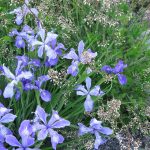Some Like It Dry
Count on iris for summer-dry gardens

Significant rain in early October is a boon to gardeners who value the fall gardening season. This goes in spades for those of us who … Continue reading
We've got issues.

Significant rain in early October is a boon to gardeners who value the fall gardening season. This goes in spades for those of us who … Continue reading
The equinox passing is reflected in shorter days. The rate of change itself changes. Change in day length is fastest at equinox and slowest at solstice. The day-to-day change at equinox is about 3 minutes a day but only 30 seconds a day at winter solstice. At the end of September, seeds of incense cedar were scattered to the winds and now their cones are raining down. The cones of incense cedar decompose over winter and are gone by spring. Continue reading
August went by in flash, as usual. Daily watering chores. Jam making. An ocean of applesauce. After a week’s vacation in a cabin by the Metolius, I somehow carved out time to think about the fall and winter vegetable garden. Space must be carved out, too, and I’m grateful for any crops that can go in after the pole beans and tomatoes are torn out in October. But starts of red Russian kale, my favorite for winter eating, need to go in as soon as possible. By October what you see is more or less what you get until growth starts up again in March. Continue reading
September is the month that hikers in western Oregon look forward to more than any month. Rainless days are almost guaranteed, mosquito levels drop off quickly and tourists thin out after Labor Day. This year there are a few qualifications to what is typically our best month for backpacking. Mosquito levels may be slow to disappear in the high country because there haven’t been enough freezing nights. Continue reading
The mosquito fern that covered the eastside Delta Ponds’ surfaces with dramatic purple the past two winters had nearly disappeared by late spring of this year. The duckweed family overtook the mosquito fern and turned the ponds green, much to the gustatory delight of the waterfowl. Suddenly, in July, the mosquito fern has made a resurgence and may regain dominance; observations to come. Even the green is different. Instead of common duckweed, the green is dominated by the tiny water meal (Wolffia) of the flowering duckweed family. Continue reading
By July, gardens are burgeoning with flowers and vegetables. They will thrive through the summer only if we pay diligent attention to adequate watering. Digital hose timers are great for extended trips out of town. We also have to deal with combatting weeds and pests. I wrestle with use of poisons. Slug bait offends my organic sensibilities but it seems the only effective way to keep snails away from our hostas and lilies. Continue reading

Tired of sitting around and watching other people run (or standing and screaming for them, as the case may be)? Want to meditate on the joys of J.S. Bach among Oregon’s greenery? Lane County is not lacking in places close in or a little way out of town to take a summer walk on a break from town. Continue reading
Not every garden in the Willamette Valley has super river-bottom silty loam. If your soil sets up like concrete when it’s dry it probably holds lots of moisture in the winter. Some wonderful summer blooming perennials have a problem with that. I’m thinking in particular of the many ravishing cultivars of agastache (ag-ah-STAK-ee) and salvia that have hit the market in recent decades. Lots of them need really good drainage to over-winter reliably in our region. Continue reading
Summer solstice is arguably the most significant of all solar events. That the sun shone straight down a well in Syrene, Egypt, every summer solstice day gave Eratosthenes the insight for determining the Earth’s circumference 2,200 years ago. Stone monuments worldwide are aligned to commemorate this longest day of the year. The bronze sighting monument on the summit of Mount Pisgah has slots that line up with sunrise and sunset on the solstice. Continue reading
A few weeks ago, I ran into Steve Solomon and Marina McShane at the Lane County Farmers Market. This meeting was remarkable for two reasons. One, Solomon, a guru of Northwest vegetable gardening and founder of Territorial Seed Company, has lived in Tasmania since 1998. Two, McShane had recently given me a copy of a book she and Solomon wrote together. Continue reading